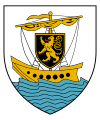High Sheriff of Galway Town
The High Sheriff of Galway Town was the Sovereign's judicial representative in the county of the Town of Galway. Initially an office for lifetime, assigned by the Sovereign, the role of High Sheriff became annually appointed from the Provisions of Oxford in 1258.[1] Besides the judicial importance of the role, it had ceremonial and administrative functions and executed High Court Writs.[2]
History
[edit]The first (High) Shrievalties were established before the Norman Conquest in 1066, dating back to Saxon times.[3] In 1908, an Order in Council made the Lord-Lieutenant the Sovereign's prime representative in the counties of the United Kingdom and reduced the precedence of the High Sheriff's role.[4] Despite that, the office-holder retained their responsibilities for the preservation of law and order in a county.[2]
The first High Sheriff of the town of Galway was appointed in 1841[5] and the last one in 1899.[6]
Victoria, 1841–1899
[edit]- 1841: Martin Morris[5]
- 1843: Nicholas Lynch[7]
- 1845: Patrick Marcus Lynch[8]
- 1848: T A. Joyce of Rahasau, Loughrea.[9]
- 1849: Michael Morris[10]
- 1850: Thomas Moore Persse[11]
- 1851: Mark Anthony Lynch[12]
- 1856: Ambrose Rush[13]
- 1857: Peter Sarsfield Comyn
- 1858: John Wilson Lynch of Duras and Renmore.[14]
- 1860: George Morris[15]
- 1862: Henry Hodgsen[16]
- 1867: Pierce John Joyce[17]
- 1868: Henry Sadleir Persse[7]
- 1868: Francis Comyn of Woodstock[7]
- 1870: Marcus Lynch, JP of Barna House.
- 1872: Sir Valentine Blake, 14th Bt.[14]
- 1874: Charles French Blake-Forster[18]
- 1878: Francis O'Donnellan Blake-Forster[14]
- 1881: Rickard Blake.[14]
- 1882: Robert William Waithman.[7]
- 1884: Thomas G.P. Halett.[19]
- 1885: Walter Martin Blake.[7]
- 1886: Llewellyn Blake.[7]
- 1887: Arthur Henry Courtenay.[17]
- 1888: William Henry Persse.[7]
- 1890: De Burgh Fitzpatrick Persse.[20]
- 1892: Robert French Blake.[7]
- 1893: John Joseph Chevers.[21]
- 1898: Sir William Henry Mahon, 5th Baronet of Castlebar, Ahascragh.[22]
- 1899: Thomas William Moffett.[6]
References
[edit]- ^ John David Griffith Davies; Frederick Robert Worts (1928). England in the Middle Ages: Its Problems and Legacies. A. A. Knopf. p. 119.
- ^ a b Alexander, George Glover (1915). The Administration of Justice in Criminal Matters (in England and Wales). The University Press. pp. 89.
- ^ Morris, William Alfred (1968). The Medieval English Sheriff to 1300. Manchester: Manchester University Press. pp. 73. ISBN 0-7190-0342-3.
- ^ Millward, Paul (2007). Civic Ceremonial: A Handbook, History and Guide for Mayors, Councillors and Officers. Shaw. p. 163. ISBN 978-0-7219-0164-0.
- ^ a b Charles ffrench, Blake-Forster (1872). The Irish Chieftains or A Struggle for The Crown. McGlashin and Gill. p. 675.
- ^ a b Who is Who 1903. London: Adam & Charles Black Ltd. 1903. p. 963.
- ^ a b c d e f g h Burke, Sir Bernhard (1912). Arthur Charles Fox-Davies (ed.). A Genealogical and Heraldic History of the Landed Gentry of Ireland. London: Harrison & Sons.
- ^ "High Sheriffs, 1845". The Armagh Guardian. 4 February 1845. Retrieved 10 August 2009.
- ^ "The Sydney Morning Herald (NSW : 1842 – 1954)". Sydney Morning Herald. Trove. 17 June 1848. Retrieved 3 August 2013.
- ^ "High Sheriffs, 1849". Anglo-Celt. 26 January 1849. Retrieved 10 August 2009.
- ^ "High Sheriffs, 1850". Ballina Chronicle. 2 January 1850. Retrieved 10 August 2009.
- ^ Thom, Alexander (1852). Thom's Irish Almanac and Official Directory. Dublin: Alexander Thom. p. 555.
- ^ Thom, Alexander (1857). Thom's Irish Almanac and Official Directory of the United Kingdom. Dublin: Alexander Thom and Sons. p. 875.
- ^ a b c d Walford, Edward (1909). The County Families of the United Kingdom. London: Spottiswoode & Co. Ltd.
- ^ Walford, Edward (1860). The County Families of the United Kingdom. London: Robert Hardwicke.
- ^ "High Sheriffs, 1862". The Cavan Observer. 18 January 1862. Retrieved 9 July 2009.
- ^ a b Walford, Edward (1919). The County Families of the United Kingdom. London: Robert Spottiswoode, Ballantyne & Co. Ltd.
- ^ O'gorman, Ronnie (12 March 2009). "Two faces lean out of the window..." Galway Advertiser. Retrieved 22 December 2009.
- ^ "The Sydney Morning Herald (NSW : 1842 – 1954) Wednesday 30 September 1885". Sydney Morning Herald. Trove. 30 September 1885. Retrieved 4 August 2013.
- ^ Persse, Michael D. de B. Collins (1974). "Persse, De Burgh Fitzpatrick (1840–1921)". Australian Dictionary of Biography. Canberra: National Centre of Biography, Australian National University. ISBN 978-0-522-84459-7. ISSN 1833-7538. OCLC 70677943. Retrieved 13 December 2009.
- ^ Fox-Davies, Arthur Charles (1929). Armorial Families. Vol. I. London: Hurst & Blackett.
- ^ Kelly's Handbook to the Titled, Landed and Official Classes. 1916.


 French
French Deutsch
Deutsch